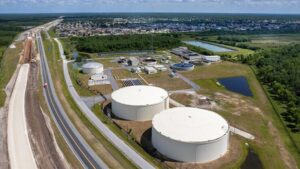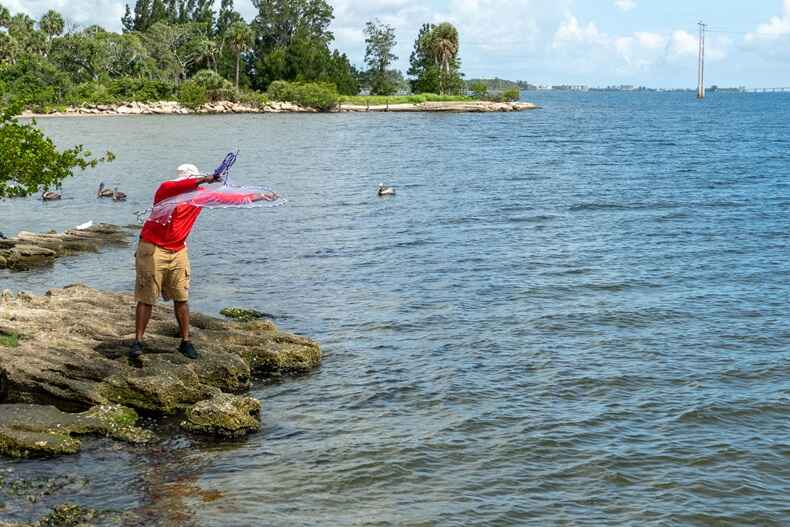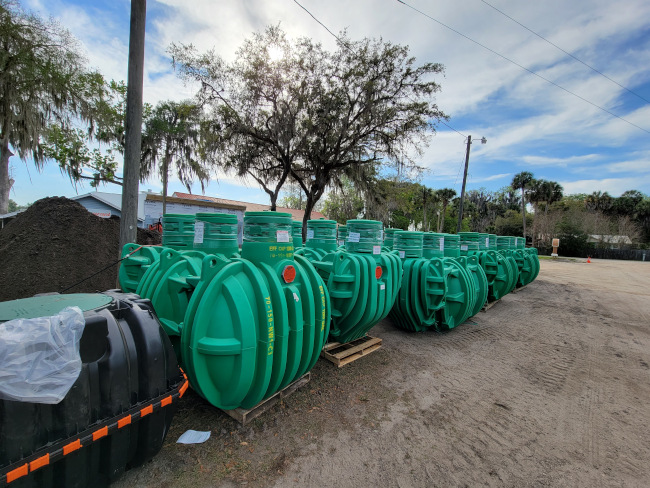TEXAS
Turkish Solar Panel Manufacturer to Establish Waller County Facility
Elin Energy, Europe’s largest solar panel manufacturer, is set to establish a new advanced manufacturing facility in Waller County, west of Houston. The incentive deal was approved by the Waller County Commissioners’ Court on September 27th, and the facility is expected to have an annual manufacturing capacity of 2,000 MW. Elin Energy, with its corporate headquarters in Turkey, is a leader in advanced energy solutions and aims to contribute to a greener and cleaner future powered by solar energy. The new facility, scheduled to be operational by Q1 2024, will initially create around 100 jobs with an estimated 450 jobs by the end of its seventh year of operation. Learn More
BP Partners to Build Solar Farm
BP Oil and Lightsource bp are partnering to build a solar farm in Gregory, with the aim of supporting local company Gulf Coast Growth Venture’s plastics plant. The Peacock Solar Farm will house around 800,000 solar panels and is expected to provide up to 40 percent of the electrical needs for the plastics plant. The project will create hundreds of new jobs and generate $25 million in tax revenue over the first 25 years. The farm will have a capacity of 187 million watts and is set to be completed next year. Additionally, there are discussions about constructing more solar farms in the Gregory and Aransas Pass area, which could further contribute to the region’s economic development. Learn More
LOUISIANA
Mississippi River Saltwater Wedge Crisis Largely Averted
A saltwater wedge in the Mississippi River that was moving upriver as a result of low rainfalls throughout the Mississippi River Valley and threatened freshwater supplies all along southeast Louisiana, is moving slower than expected towards New Orleans. The Army Corps of Engineers initially estimated that the saltwater could potentially pollute the city’s water supply within three weeks, but now it is projected to reach New Orleans in late November. The leading edge of the saltwater has remained stagnant since September 24, and the slowdown is attributed to better-than-forecasted flows in September and an updated 28-day forecast showing more rainfall for October. Measures are being taken to ensure safe drinking water, including the construction of an artificial basin and plans to pump in fresh water to dilute the saltwater. The intrusion of saltwater into the river is a result of drought, subsidence, rising seas, and human-made changes to the river. Learn More
Entergy to Sell its Gas Division
Entergy Corp., a utility company, is selling its natural gas distribution business to Bernhard Capital Partners for $484 million. The sale is part of Entergy’s strategy shift to focus on supplying electricity and paying down debt. The deal, subject to regulatory approval, will result in a new gas provider for approximately 200,000 customers in Baton Rouge and New Orleans. Entergy assures customers that there will be no immediate changes in gas service or bills, and they will work to ensure a smooth transition. The move aligns with the trend of utilities selling fossil fuel assets to invest in renewable energy infrastructure. Learn More
New Orleans City Council Unanimously Approves Community Solar Changes
New Orleans city officials have amended regulations to encourage the development of solar gardens, which are community solar energy projects aimed at assisting low-income residents. The changes include increasing the value of bill credits for solar power generation and raising the generation capacity of solar gardens to 5 megawatts. The program offers an alternative to buying solar panels by allowing residents to subscribe to community solar projects located throughout the city. As subscribers, they receive credits on their electric bill corresponding to the energy generated by these solar gardens. The Catholic order, Sisters of the Holy Family, plans to build a neighborhood solar garden to reduce energy costs for the poor in their community. The reforms are expected to make these investments less risky and promote the use of carbon-free energy. Learn More
Statewide Microgrid Project Funded
The federal government is providing assistance to 375 communities in Louisiana to help establish microgrids to maintain power during storms. The initiative involves setting up solar panels and battery arrays that can generate electricity for a neighborhood when the main power grid is disrupted. These microgrids will allow communities to disconnect from the larger grid and have backup power, combining solar energy with battery storage. The federal and state governments are each contributing $249.3 million to fund this effort, which aims to improve the resilience and reliability of the electric grid in Louisiana.
The federal government’s funding, part of the Infrastructure Investment and Jobs Act, will help Louisiana create microgrid hubs in critical facilities and vulnerable communities. Lower-income communities will be prioritized initially, and the Louisiana Department of Natural Resources will oversee the building and operation of the microgrid hubs. Learn More
Orphan Wells Rules Strengthened
Louisiana has implemented a stronger rule to address the issue of orphaned oil and gas wells. The new regulation limits extensions of future utility status for drillers and increases fees for inactive and unplugged wells. It also provides incentives for operators to plug multiple wells annually. These wells, which have been abandoned without a financially responsible owner, pose significant environmental risks and can be expensive to repair. Additionally, there are around 17,000 non-productive wells registered as having future utility, allowing operators to avoid plugging them. Unplugged wells can leak methane, contaminate water, and hinder economic land use. Louisiana has received over $100 million in federal funding to plug orphaned wells and aims to secure up to $70 million more through the new regulation. Learn More
MISSISSIPPI
Gulf Coast Restoration Funds Approved
Governor Tate Reeves of Mississippi has approved more than $44 million for 15 new projects under the RESTORE Act, aimed at enhancing the state’s Gulf Coast. These projects, recommended by the Governor’s Gulf Coast Advisory Committee, include initiatives such as revitalizing the Hancock County Fairgrounds, improving the Gulfport-Biloxi International Airport, establishing a scenic trail along the Pascagoula River, creating an artificial reef, and implementing a coastal education program for high schools. The projects will be managed by the Mississippi Department of Environmental Quality, and they contribute to the overall restoration efforts, totaling more than $227 million, approved during Governor Reeves’ administration. Learn More
Nation’s First Agricultural Autonomy Institute Established at MSU
Mississippi State University (MSU) has officially opened the Agricultural Autonomy Institute, the first interdisciplinary research center in the United States dedicated to autonomous technologies in agriculture. The institute aims to enhance on-farm precision and efficiency by utilizing robotics, artificial intelligence, and remote sensing. It serves as a hub for researchers interested in autonomous systems that can increase agricultural productivity and reduce labor shortages. The institute’s focus is on economic development, attracting agricultural equipment companies, conducting research leading to technology-based startups, and developing a workforce skilled in robotics and coding. With a 4,800-square-foot laboratory and a five-acre proving ground, the institute is jointly managed by MSU’s Office of Research and Economic Development and the Division of Agriculture, Forestry, and Veterinary Medicine, with support from various colleges, research centers, and departments within the university. Learn More
ALABAMA
Mitsubishi Power and PowerSouth Energy Coop Partner on Lowman Energy Site
PowerSouth Energy Cooperative and Mitsubishi Power are celebrating the start of commercial operations at the new Lowman Energy Center (LEC) in Leroy. The state-of-the-art power plant, which began construction in 2020, replaces the retired Charles R. Lowman coal-fired power plant and utilizes cleaner and more efficient natural gas technology. With a capacity of 693 megawatts (MW), the LEC is designed to meet the growing energy needs of PowerSouth’s distribution members in Alabama and Northwest Florida. PowerSouth President and CEO Gary Smith emphasizes the importance of the LEC in meeting reliability and affordability challenges posed by the shift towards intermittent renewable generation. The LEC joins PowerSouth’s portfolio of natural gas-based generating facilities, further enhancing their ability to provide reliable power to their members. Learn More
Community College to Offer Electric Vehicle Tech Program
Wallace State Community College in Alabama has introduced a new electric truck for its diesel technology program, becoming the first in the state to do so. The college aims to provide proactive learning opportunities for students and purchased a Kenworth T680E Class 8 heavy-duty electric vehicle through a grant. The truck will allow students to gain hands-on experience with electric vehicles, preparing them for the increasing presence of electric technology in the trucking industry. Additionally, Wallace State received a donation to install two electric vehicle charging stations, further supporting its commitment to embracing the trend towards electric vehicles in the industry. Learn More
EPA Launches Civil Rights Probe
The Environmental Protection Agency (EPA) has initiated a civil rights investigation into the Alabama Department of Environmental Management regarding the state’s handling of federal funds for water infrastructure. Advocates have filed a complaint alleging that Black residents in rural areas of Alabama have been hindered from accessing federal funds to update their wastewater systems, resulting in inadequate wastewater infrastructure and the spread of parasitic diseases. The complaint argues that the state’s distribution of funds from the Clean Water State Revolving Fund has excluded rural homeowners and community groups, causing disparities in access to financial support for onsite septic tanks. The EPA’s probe aims to address these issues statewide, potentially requiring regulators to accept individual household bids for funding and conduct outreach to communities unaware of available assistance. Learn More
Coal Ash Disposal Ponds Regulation Under Scrutiny
During an EPA meeting in Montgomery, the focus was on the proposed denial of the State of Alabama’s plan to allow Alabama Power to continue storing coal ash in unlined ponds near waterways. The EPA has raised concerns about the lack of protection for people and waterways in the state’s plan. At the meeting, most of the public expressed support for the EPA’s proposed denial, while representatives from the energy industry and state environmental regulators argued in favor of capping the coal ash ponds in place. The EPA’s decision to deny Alabama’s plan is significant as it marks the first-ever denial of a state plan regarding coal ash disposal. Coal ash, a waste product from burning coal, can pose serious health risks if not managed properly. The EPA has been working to address coal ash pollution and protect communities from contamination. Learn More
























